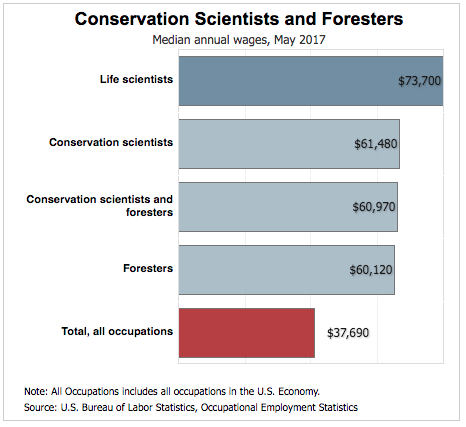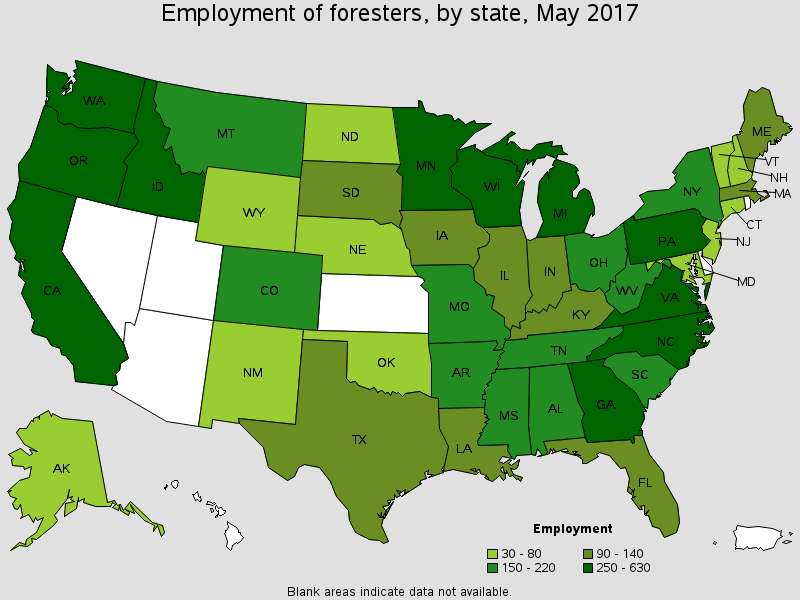
Park Ranger Job Requirements & Duties
One of the most common jobs you can pursue with a forestry degree is that of a park ranger. Park rangers are in the conservation science and forestry field, and are hired by both government-owned and private parks. In both cases, your duties will be extremely similar.
Park rangers are invaluable to the preservation of our states’ natural and cultural resources. State and national parks provide visitors opportunities to connect with the land and all that it provides.
Let’s take a look at the job of a park ranger by clicking on the links below:
- What Are The Requirements For Becoming A Park Ranger?
- What Are The Job Duties And Responsibilities Of A Park Ranger?
- Are Park Rangers Considered Law Enforcement?
- What Is The Career Outlook For Park Rangers And Similar Occupations?
What Are The Requirements For Becoming A Park Ranger?
Park rangers preserve our nation’s natural resources and protect our public lands. To become a park ranger, physical fitness and an interest in working outdoors are necessary. Park rangers spend a great deal of their time educating the public, enforcing the law, and implementing conservation efforts.
Other academic majors that are relevant to working as a park ranger include:
- Park and recreation management
- Environmental studies
- Environmental science
- Wildlife management
- Biological sciences
- Fisheries and wildlife law enforcement
Additional academy training may also be required to qualify for park ranger jobs. If you want to work for the National Park Service (NPS), you might want to consider volunteer and seasonal work while earning your degree. This will serve you well when applying for full-time opportunities with the NPS, since you’ll gain invaluable experience and connections.
Local parks departments and state park systems often maintain requirements similar to those of the NPS, and often look for candidates with an appropriate combination of education and experience.
Park rangers also work in a number of other settings, including national seashores, battlefields, national monuments, and other historic sites. These positions may require the ability to work evenings, weekends, and holidays.
To work as a park ranger, you’ll need the right credentials, starting with a degree in forestry or conservation science. A degree in forestry or conservation science provides the educational background necessary to successfully fulfill the job duties of a park ranger. The programs listed below will help you get started:
What Are The Job Duties And Responsibilities Of A Park Ranger?
Your overall goal as a park ranger is to ensure that visitors to the park are safe and happy, and that the natural environment is preserved. To do this, you’ll need to do inspections of the park (or part of the park) you service. You’ll report any problems, like blocked trails, and noting potential risks, like overflowing rivers. Also, you’ll greet visitors, explain the rules of the park, and enforce park rules.
As the seasons change, so will some of your responsibilities as a park ranger. Every spring, you’ll be responsible for checking trails and clearing them when necessary, as well as inspecting campsites and preparing the area for visitors. Maintenance during the summer and fall could include raking leaves from pathways, pruning overgrown plants, caring for buildings in the park such as shower facilities, and reporting fires. When the weather turns cold, you’ll have to winterize the park.
Emergency care is sometimes needed, and you may be called upon to administer CPR or first aid, assist with search and rescue efforts, and help stop or contain forest fires. Park rangers are first responders, so it is also important for you to know the correct lines of communication and processes to take when there is an emergency.
You will also be responsible for animal emergencies. This may include reporting or caring for wounded animals, trapping or tranquilizing sick or threatening animals, and removing animal carcasses if necessary. The goal is to leave the park as natural and undisturbed as possible, but you also need to make sure the grounds are safe and enjoyable for human visitors.
Other important job duties include the following:
- Conduct field trips to point out scientific, historic, and natural features of parks, forests, historic sites, or other attractions.
- Prepare and present illustrated lectures and interpretive talks about park features.
- Plan and organize public events at the park.
- Provide visitor services, such as explaining regulations, providing information about the park and surrounding areas, and answering visitor requests, needs, and complaints.
- Develop environmental educational programs and curricula for schools.
Park rangers play an integral role in creating a welcoming environment for visitors. They not only keep our parks cleaner and safer, but also increase outreach to preserve our land and its natural resources.
Are Park Rangers Considered Law Enforcement?
Park rangers in the Federal Government are considered law enforcement. In fact, rangers with the NPS are referred to as law enforcement rangers. Because park rangers are considered peace officers, they are authorized to carry a weapon and make arrests. It’s the responsibility of a park ranger to protect parks from those who would do damage to them.
Park rangers are also responsible for ensuring local, state, and national parks are clean and enjoyable for visitors. This requires park rangers to patrol the grounds to arrest offenders, and deter and prevent illegal activity.
National Park Service ranger training is organized through the NPS Office of Learning and Development. Through these training programs, future rangers learn how to enforce park regulations and local/state/federal laws. To qualify for training, you’ll need to meet the following minimum qualifications:
- US citizenship
- The completion of a background/security investigation
- A state issued driver’s license
- A pre-employment medical exam and drug test
- A Physical Efficiency Battery (PEB)
What Is The Career Outlook For Park Rangers And Similar Occupations?
In addition to working as a park ranger, you can also look into work as a conservationist, environmentalist, firefighter, and many other challenging professions. While you’re pursuing your degree in forestry, it’s a good idea to research the different areas of specialization available to you. That way you take the classes necessary to meet your academic and career goals.
According to The Bureau of Labor Statistics, the median annual wage for foresters was $60,120 in May 2017. The lowest 10 percent earned less than $40,480, and the highest 10 percent earned more than $84,830. The graph below illustrates an updated pay scale for foresters and conservation scientists (source: BLS.gov: Occupational Employment And Wages: Conservation Scientists and Foresters, data for May 2017).

The Bureau of Labor Statistics has provided a list of other jobs in the forestry field and their respective salaries. Check out the list below to learn more about what careers are available for someone with a forestry and wildlife conservation degree:
- Agricultural and Food Scientists – Agricultural and food scientists research ways to improve the efficiency and safety of agricultural establishments and products. Median Salary, May 2017: $62,910
- Environmental Science and Protection Technicians – Environmental science and protection technicians monitor the environment and investigate sources of pollution and contamination, including those affecting public health. Median Salary, May 2017: $45,490
- Zoologists and Wildlife Biologists – Zoologists and wildlife biologists study animals and other wildlife and how they interact with their ecosystems. They study the physical characteristics of animals, animal behaviors, and the impacts humans have on wildlife and natural habitats. Median Salary, May 2017: $62,290
Since heavily wooded areas are necessary for this position, relocation may be a possibility. The states with the highest employment rates for foresters are Washington, Wisconsin, Oregon, California, and Minnesota. There are also many forests and parks outside of major metropolitan areas. The highest paying cities for this job include: Sacramento, CA; Los Angeles, CA; Albany, OR; Hartford, CT; Seattle, WA; Longview, WA; Washington D.C.; Eugene, OR; Chicago, IL; and Salem, OR.
Some parks refer to park rangers as foresters or forest rangers. To give you a better idea of the employment outlook for foresters, the map below offers a geographic profile of the states with the highest employment level in this occupation (source: BLS.gov: Occupational Employment And Wages: Foresters, data for May 2017).

The jobs listed above are just a few of the many opportunities available to forestry students. If you’re not sure what you want to focus your studies on, meet with your adviser to learn about the different career options out there.
To ensure you’ve picked the right field, it’s important to learn as much as you can about forestry before applying to a program. Meet with leaders in the field, or apply for a summer internship to gain experience and network with other professionals.
If you live near a national park, perhaps you can work as a visitor’s guide assistant or a seasonal maintenance worker. On-the-job training is an effective method for improving your skills and know-how. And the more you network and market yourself, the better your chances are for finding a job after graduation.




